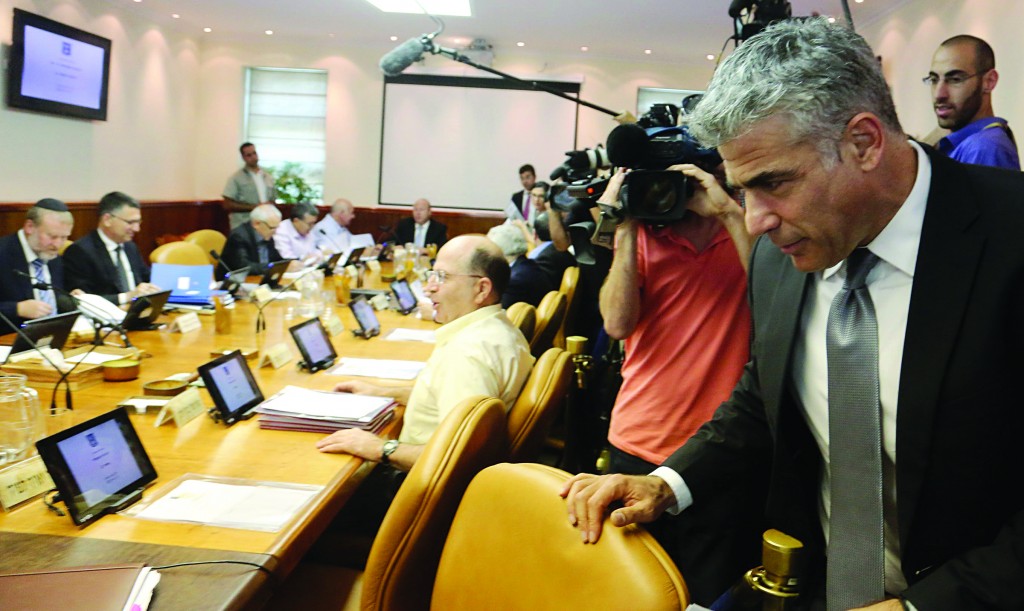Opposition Demands Budget Info

VAT Hits 18 Percent
Opposition leader Shelly Yacimovich (Labor) demanded a policy of transparency from Finance Minister Yair Lapid on Sunday, saying that the Knesset cannot seriously discuss the proposed budget until he discloses all the relevant facts and figures, The Jerusalem Post reported.
In a letter to Lapid, Yacimovich said that only “the full factual infrastructure will allow for significant parliamentary discussion based on data.”
“This is a process that is structurally superficial and hasty, unfortunately, because of the makeup of the Economic Arrangements Law, which I oppose: A law consisting of reforms, cuts, cancellation of laws all at once, instead of a deep discussion of each article while examining alternatives and repercussions,” she said.
The opposition leader added that she was pleased to hear Lapid say the discussion should be based on facts, and asked for him to facilitate such a discussion by opening Finance Ministry books to the Knesset.
The data Yacimovich requested makes up the macro-economic basis of the 2013-2014 budget, and includes the expected growth rate, inflation, change in average wage and unemployment.
Yacimovich also asked that the Finance Ministry report deficit targets, automatic expenditures on legislation, government decisions and agreements binding the state in 2013-2014.
The Finance Ministry should also explain how it arrived at the spending limit, revenue forecast and expected deficit figures.
“Only presenting all of the facts will allow MKs to fully do their job,” Yacimovich wrote to Lapid. “I am sure that you, too, see the great importance in this.”
Meanwhile, the value-added tax rate rose from 17% to 18% at midnight Motzoei Shabbos, following a directive from Lapid. This is the third time since VAT was introduced in 1976 (at 8%) that Israeli consumers will be paying 18%, the highest rate VAT has ever reached. It hit 18% twice before, during periods of economic difficulty.
The Israel Tax Authority says Sunday’s VAT increase will generate NIS 4.4 billion a year in new revenues, helping to close a 30 billion shekel deficit.
Some economists argue that 1 percentage point increase will not raise NIS 4.4 billion a year, that the figure is overly optimistic, especially if the economy slows down, Haaretz reported. They warn that higher taxes will weaken consumer spending.
Due to today’s VAT hike, the Agriculture Ministry adjusted the price of price-controlled dairy products and eggs. The new price of a liter of 1% milk sold in a plastic bag is NIS 4.95; for 3% milk it is now NIS 5.28. The comparable prices for liter cartons of milk are NIS 6.11 and NIS 6.54. The price of 100 grams of butter is now NIS 4.08, and consumers will be paying NIS 4.60 for 100 grams of hard “emek” cheese.
The maximum selling price for gasoline increased at midnight, in part due to the increased VAT rate. It was also due to the higher cost of gasoline in Europe, with which the price ceiling in Israel is aligned, and to the decline of the shekel against the dollar over the past month. Motorists are now paying a maximum NIS 7.52 a liter for self-serve 95 octane gasoline, which is 26 agorot more than in May.
This article appeared in print on page 6 of edition of Hamodia.
To Read The Full Story
Are you already a subscriber?
Click "Sign In" to log in!

Become a Web Subscriber
Click “Subscribe” below to begin the process of becoming a new subscriber.

Become a Print + Web Subscriber
Click “Subscribe” below to begin the process of becoming a new subscriber.

Renew Print + Web Subscription
Click “Renew Subscription” below to begin the process of renewing your subscription.












